- Home
- Phillip Tomasso
Johnny Blade Page 10
Johnny Blade Read online
Page 10
“The forensics tech took a temperature. The M.E.’s here, but wanted to wait until he had the body on his table before he commented. Can’t blame him. With how cold it is, he’s going to need the liver to give us a better idea,” Cage noted.
“Any witnesses, anything?”
“Nothing like a witness. An old man walking his dog without a leash found the body. The dog took off, ran up here and started sniffing around. Guy came up for his dog, saw the body and puked.”
Jason stood up straight. “When was this?”
“Two hours ago.”
It had been snowing all day. “How exposed was the body?”
“Wasn’t. The dog did a little digging. When the first police car arrived, he secured the area. No one was really around. The man and his dog were waiting for him at the bottom of the slope. By the time I got here, everything was still preserved, minus the mutt’s digging,” Peter Cage explained. “The victim’s toes were sticking out of the snow, but her legs, belly and arms were buried. The dog had done his digging around the head.”
“What would you guess, four inches of snow on top of her?”
“Sounds close, for a guess,” Cage said.
“Let’s contact the weather bureau, find out the accumulation and times and see if we can’t better determine how long ago the body was dumped.” Jason walked back toward the snow-hidden staircase. He wanted to get his own camera out of the car.
“So you think it’s the same killer, too?”
Without looking back, Jason said: “It sure as hell looks that way.”
Chapter 22
Never married, Jason did not feel the pang of guilt many police officers felt when they needed to work long, grueling hours. Most women he dated understood this going into the relationship, but seemed to forget their ‘understanding’ after a few weeks. He could not blame them. Relationships were difficult and trying enough without the added variable of time-absorbing-homicide-detective to the list of seemingly never-ending compromises. Not that compromise is bad. It is not. It is good, at least when it is two-sided. Women wanted Jason to compromise his life’s work to attend a friend’s party, or a wedding, or a funeral. His schedule was not a nine to five day. Day or night, if someone is murdered, Jason needed to be available.
The first forty-eight hours after a homicide are the most critical. For two days he would not see, or even call, a girlfriend. All his girlfriends hated that part of the relationship. What they continually failed to realize is if a murderer is not caught within those two days, the chances of catching the killer grow less and less likely with each passing minute.
Most murderers kill a person they know, so police will spend hours around the clock investigating, by interviewing friends and family of the victim. More times than not this task intensive method produces several suspect leads. It is rare, although it does happen, when a person is killed by a stranger.
The serial killer is more unique. Though only two victims had shown up, there is a pattern that Jason was all too familiar with. The definition of a serial killer is when a person kills more than three people at different times, when the killing methods are similar and the killer does many things to protect his identity and avoid being apprehended.
Jason Cocuzzi knew he was dealing with a serial killer, regardless of the low body count, and serial killings were nothing new to the Rochester area. One of the most renowned serial killers was Arthur Shawcross, who moved from Watertown, New York to Rochester. In 1972, Shawcross was convicted and served only fifteen years of a twenty-five year sentence. His crime? Shawcross brutally murdered two children, a young ten-year-old boy and an eight-year-old girl.
When Shawcross arrived in Rochester, and got married, few people knew about the murderer’s horrid past. Not owning a car, Shawcross would often be seen riding a ‘girl’s’ bicycle to go fishing along the banks of the murky waters of the Genesee. However, in 1988, a killing spree had started. Bodies of murdered and mutilated prostitutes began showing up all over the place.
Within two years, and five bodies later, the police knew for certain that they were dealing with a serial killer. The name donned for the maniac? The Genesee River Killer.
As luck would have it, a police helicopter spotted a body in Salmon Creek and a man on the bridge with his car, urinating in a bottle. A squad car was dispatched and followed the driver to a nursing home. Shawcross had borrowed his mistress’ car. The police eventually let him go, but picked him up the following day when, upon further exploration of the impounded vehicle, they found an earring to match that of one of the dead prostitutes. After four hours of interrogation, Arthur Shawcross confessed to being the Genesee River Killer.
One of the gruesome details from the case that struck a chord with Jason was the fact that Shawcross often times cut out the vaginas of his victims, and then ate them. The killer Jason was dealing with now seemed to be using his blade like a penis. If Shawcross had not been sentenced to consecutive life terms, he would swear the bastard had escaped from prison and was back to terrorizing his old stomping grounds.
Though the police and the FBI did fantastic work combining talent, resources and using technology to find and convict Shawcross, Jason did not want to risk waiting for another three bodies to show up before catching this new Rochester nightmare.
At his trunk, Jason Cocuzzi retrieved his own crime scene bag. With experience teaching him what to pack, Jason felt confident that he would be ready for most situations. The bag was stuffed full with boxes of Latex gloves, brown paper bags in a variety of sizes, Kodak one-time-use cameras, a tape recorder, flashlights, batteries, a knife, tape, rope, paper, pens and just about anything else he might need or want, at a crime scene.
When he closed the trunk lid, Peter Cage was standing at the front of Jason’s car with his hands in his pockets. “Hey, detective?”
“You can call me, Jason.”
“I just got off the horn with my chief. He wants me to offer my assistance to you. He doesn’t like the idea of the body being dumped in his neck of the woods,” Peter said hesitantly.
“I don’t have a problem with that,” Jason replied. The department was always short warm bodies. He would welcome the help of an experienced detective.
“Yeah, great. I’m sure there’s some PR bullshit tied up in there someplace, too,” Peter Cage added, thoughtfully.
“Usually is. How many homicide cases have you worked?” Jason asked.
“Including this one?” Cage said, disdainfully. “One.”
The body of Casey Hawthorne had been discovered at the base of the Charlotte Lighthouse, by a couple taking photographs of the historic landmark. To get to the lighthouse, you needed to drive down Stutson Street. Stutson Street also led you over the river into Irondequoit. So, in retrospect, both of the victims were dumped in a generic central location.
While the detectives walked back up to the scene, Jason began to brief Peter on some of the facts of the Hawthorne case. “Casey was twenty-three, pretty—or was, until the killer used a blade to slice up her skin. She had a distinct hair color, blond with black streaks in it. Like Vanessa Vorhees, Casey had been a prostitute, too. She had a short arrest record, but little else. A case like this is more difficult to investigate because the chances are much better that a john—a total stranger—killed them.”
“Where’d you start digging?” Detective Cage asked.
“The corner they hang out on has a small restaurant, a diner, really, a place called Jack’s Joint. The hole’s filled with all the types of city riff raff. Believe it or not, we rarely get calls to dispatch units. It’s kind of like a place for the crooks and prostitutes to hang out while they wait for their next, I don’t know what you’d call it, thing.” Jason said. “I went there, talked with the owner, talked with some of the other girls, talked with a couple of regulars, but turned up nothing. It took me forever to have everyone relax. They were all so worried about getting arrested themselves, that they only half heard everything I was saying to the
m. The girls I talked to were helpful. They knew Casey and were genuinely distraught by the news of her death.”
“So now we have to stand out here freezing our asses off because another two-bit whore gets herself killed,” Peter Cage said. “This is great, just wonderful.”
Jason closed his mouth and stared intently at the unseasoned detective. “You got a problem, detective?”
“No. Yeah, I guess I do. I can’t see why—”
“I didn’t ask you what that problem was, and I don’t want to hear about your problem again. For your information the two-bit whores being murdered are women. They are people, human beings. Believe it or not, I’ll bet my pension that neither one of these unfortunate victims went out and ‘got themselves killed’. Someone brutally murdered them—vicious, disgusting and just brutal murders,” Jason said more loudly than he had planned. His voice attracted the unwanted attention of those working the scene. His purpose was not to humiliate the Irondequoit detective, just sternly to reprimand him.
“You're right, detective. And I’m sorry,” Peter Cage said.
Satisfied, Jason nodded.
“From now on, I’ll keep my problems to myself,” Cage said spitefully, and walked away.
Shaking his head, Jason nearly jumped when someone tapped his shoulder.
“Sorry, I didn’t mean to startle you,” the man said. Except for dark brown eyes and wrinkled skin around them, Jason saw little of the man’s face. He was sure a person was somewhere buried under the layers of winter clothing.
“Detective Jason Cocuzzi. Can I help you?”
“It’s Dr. Green,” the man replied.
The M.E. “Alex is that you under all that clothing?”
“I been out here two hours, I’m damn glad I wore all this.”
“They call you away from home, too?” Jason asked, figuring Monroe County would want to use the same medical examiner for this victim as was used for Hawthorne.
“They would have, I’m sure, but no, tonight was my night on call,” Dr. Green pointed out. “Get a chance to look at the body? Is it all right if we wrap it up and head back to the morgue?”
“I just want to snap off a few photos. I’ll be quick about it,” Jason explained.
“That’s fine. Hey, I heard that exchange between you and the other detective.”
“Young and inexperienced,” Jason commented.
You could say that,” Dr. Green said. “I just think he’s a prick.”
Chapter 23
Fatso and Michael Buzzelli had been arguing about the Superbowl all night. “You’re not seeing it, kid. The Giants are a more powerful team. The Dolphins look good on paper, but they only win games by the skin of their teeth,” Fatso said. The sports section of the paper was laid out in front of him on the counter. “Most of the games they won, they only won by three points.”
“Did they win the games though, Fatso? Huh? They won them, right? From what I hear, you only need to win by one point. Unless the rules have changed,” Michael said sarcastically. “The quarterback is young, has a strong arm, and his line gives him enough time—more than enough time—to get rid of the ball.”
“He’s no Dan Marino,” Fatso commented. Marino has been critically acclaimed as the Dolphins best quarterback ever, but many think he may have been the best quarter back in NFL history—despite never winning a Superbowl.
Growing increasingly annoyed with Fatso, Michael silently noted that Marcus had not been in yet. He wondered if the man would show. He could not help but think the reason behind the absence was based on the altercation that had taken place last Saturday night.
The wind picked up outside, sounding like a giant, rabid werewolf howling at a full moon. In truth, the moon was hidden behind thick snow clouds, which loomed over Rochester all day and had been relentlessly hammering the city with inch after inch of the annoying white stuff.
When Sandy came in, her cheeks were so red, she looked like a Raggedy Ann doll. “Do you know how cold it is out, Michael?” She asked, sitting at a counter stool. “I’m wearing a mini skirt, these stupid cowboy boots—with no traction on the bottom—and the fake fur coat. I’m frozen. Look at my hands,” she said, holding her fingers out for Michael’s expression.
“They are red,” he said. “Why don’t you wear gloves?”
“Too much clothing isn’t good in my line of work.” Sandy lit a cigarette, smiling.
“A sexy pair of thin, black leather gloves. Sounds kind of erotic to me,” Michael said.
“You think?”
“Sure.”
“Maybe I’ll have Speedy pick me up a pair tomorrow,” Sandy said, nonchalantly. “Fatso, you seen Felicia? She hasn’t been around all week. I’ve tried calling her, but nothing. Between her and Vanessa, you’d think I’m the last prostitute on earth. Hey—there’s a good title for a book, The Last Prostitute on Earth.”
“Yeah, great title, Sandy. Why don’t you write it,” Fatso said.
Michael was thinking it was a great title for a book and stored the name away in his memory. “Felicia’s father had a pretty bad heart attack last week.”
“He did? Oh, the poor thing.” Sandy looked around the place. “Should I try calling her again?”
“How do you know this?” Fatso asked Michael.
Smiling, Michael shrugged. It was answer enough, as far as Fatso would be concerned. Michael thought he noted a look of disapproval on Fatso’s face, before the large man lifted the sports page and buried himself in an article.
“Michael? Should I try calling her?” Sandy asked a second time.
Michael shrugged. His attention focused on the window. A part of him felt elated. A larger part of him was disappointed. “I don’t think you’ll need to.”
The door opened and Felicia walked in. Her eyes darted around the diner, settled on Michael. She rewarded him with a small, timid smile. She looked stunning. Michael could not believe how taken he was by her beauty. He loved that hair, those eyes. Today, unlike Saturday night, she wore her hair down. The long, loose curls bounced as she walked over to the counter and when she sat down, she needed to brush the hair away from her eyes, but did not. The dangling curl made her look exotic.
Sandy placed a hand on Felicia’s arm. “I’m sorry to hear about your dad.”
Felicia threw a dagger-look at Michael. Those gray-blue eyes looked hard as steel, cold as ice. It was a quick fling of her expression that hit its mark. Michael knew instantly that he had done something wrong. He knew instinctively what it was, too.
“Thank you,” Felicia said to Sandy. “He’s doing much better now, thank you.” The words came out short and abrupt. It seemed evident that Felicia preferred not to talk about her father, wanting to keep her personal life private.
“So, working tonight?” Michael tried to ask casually. His words caught Fatso’s attention. He saw the man peering at him from over the edge of his paper. Even Sandy gave him an odd look.
Felicia looked uncomfortable. “No,” she said. “I’m here for your cooking.”
Sandy laughed. Michael just smiled.
“It’s slow out there tonight,” Sandy said. “You’d think when it’s cold more people would want to get warmed up.”
“You’d think,” Felicia said. “Maybe I will eat before I go out. Can I get a tuna-melt, with chips? It’s the closest thing to Lobster tails.”
Michael, continuing to smile, went in back to the cooler. He picked out the small tub of tuna, added extra mayonnaise, mixed it up and made her sandwich on the counter in back. He added some pre-sliced cheese to the bread, put away the cheese and tuna. He set the sandwich on a plate and went out front to grill the order.
Two men stood in the doorway. They had everyone’s attention. One guy resembled a cop in his long, tan overcoat. The other man was wearing a heavy winter coat, but did not look like a cop. He looked like a punk.
“Do you know where Jack Murphy is?” The man wearing the heavy winter coat asked. “I’m Detective Jason Cocuzzi, with th
e Rochester Police Department. This is Detective Peter Cage, from Irondequoit.”
Setting the plate down, Michael walked the length of the counter and extended his hand to both. “I’m Michael Buzzelli. I started here about two weeks ago so Murphy could have his nights off. Is there anything I can help you with? Is this about the attempted robbery from last week?”
Michael recognized Detective Jason Cocuzzi immediately. He had seen enough about the police officer in the articles written by Sinopoli at the City Chronicle. Michael wanted to keep things cool. If he let on that he knew who Cocuzzi was, people might begin to wonder. It would ruin his angle on the story he planned to write.
Detective Cage shook his head. “Afraid not, son.”
Michael clearly saw the distressed look on Sandy and Felicia’s face. He wondered if they were about to be busted for soliciting. That did not feel right. He thought the police needed to catch a prostitute in the act of trying to sell her body for money before an arrest could be made, but he could be wrong. The women obviously knew the one policeman. They kept watching the detective in the heavy coat, Detective Cocuzzi, expectantly.
“Well,” Michael said, tentatively, “is there something I can do?”
Detective Cocuzzi, stepped forward, closer to the counter, but when he spoke, he was addressing all of the diners. “Did any of you know of a woman by the name of Vanessa Vorhees?”
“Ah God, I knew it,” Felicia said. All at once her body began to tremble. She and Sandy were crying. “Please, no.”
Detective Cage leaned on the counter. Michael did not like the look on the young cop’s face as he addressed the women. “Then you both knew the prostitute?”
Michael felt his pulse rate increase. There must have been another killing. It was the only thing that made sense. Where he thought he would be excited and anxious to be this close to the news, Michael felt his stomach muscles tightening. Could Venus have been murdered?
Felicia, as if she had been slapped, turned to look at Cage. Cocuzzi put a hand on the cop’s shoulder. Cage stood up. “I spoke with you ladies a few months ago,” Cocuzzi said, softly. “Before the holidays, when your friend Casey Hawthorne had been found.”

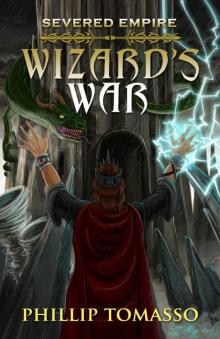 Severed Empire: Wizard's War
Severed Empire: Wizard's War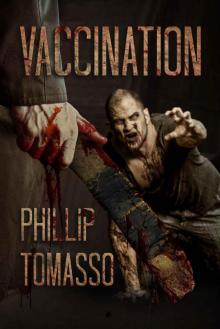 Vaccination - 01
Vaccination - 01 Extinction
Extinction Johnny Blade
Johnny Blade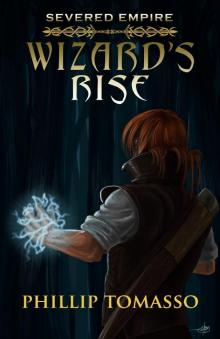 Severed Empire: Wizard's Rise
Severed Empire: Wizard's Rise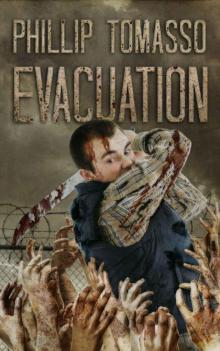 Evacuation - 02
Evacuation - 02 Absolute Zero
Absolute Zero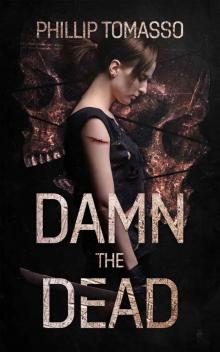 Arcadia (Book 1): Damn The Dead
Arcadia (Book 1): Damn The Dead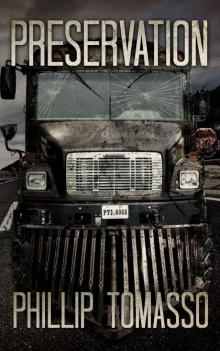 Preservation - 03
Preservation - 03